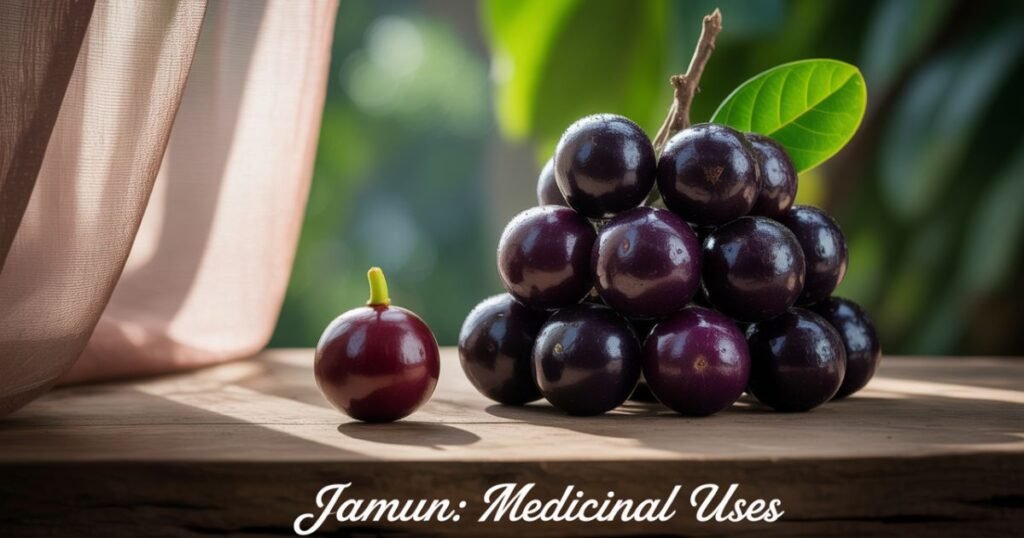Introduction

Summer brings many sweet fruits, but few match the power of Jamun. Also known as Indian blackberry, this small, purple fruit is a favorite in tropical countries. People enjoy its juicy taste, but it is more than just delicious. The health benefits of eating Jamun are amazing. It helps in fighting diseases, keeping skin fresh, and even improving digestion. Americans are now discovering this ancient fruit. Whether you eat it raw or drink Jamun juice, it’s a great natural way to stay healthy.
Nutritional Value and Chemical Composition of Jamun
The nutritional value of Jamun makes it a summer superfruit. It is rich in water and fiber but low in calories. Each 100 grams has only 60 kcal. It is loaded with vitamin C, iron, magnesium, and potassium. Jamun also contains special compounds like anthocyanins and ellagic acid, known for their healing effects. These nutrients support the immune system, control blood sugar, and protect the heart.
| Nutrient | Value per 100g |
| Energy | 60 kcal |
| Carbohydrates | 15.6 g |
| Protein | 0.72 g |
| Fat | 0.23 g |
| Vitamin C | 14.3 mg |
| Iron | 0.19 mg |
| Potassium | 79 mg |
| Magnesium | 15 mg |
This unique mix improves Jamun fruit nutrition and makes it a wise summer choice for all age groups.
Jamun Juice: Nutritional Benefits & How to Make It
Fresh Jamun juice cools the body and helps with digestion. It is rich in vitamin C and antioxidants, which clean the blood and improve skin health. Drinking Jamun juice for digestion can also help relieve bloating and gas. It is one of the best summer drinks for your gut and skin.
To prepare homemade Jamun juice, take fresh Jamuns, remove the seeds, and blend the pulp with a little water. Strain and add a few drops of lemon for taste. This simple Jamun juice recipe keeps nutrients intact and makes a healthy drink for daily use.
Medicinal and Ayurvedic Benefits of Jamun
The Ayurvedic uses of Jamun go back centuries. In traditional Indian medicine, it is used for treating diabetes, stomach issues, and infections. Jamun medicinal uses also include healing wounds, boosting energy, and protecting the liver. Ayurveda believes Jamun balances body heat and reduces toxins.
Modern studies confirm that jamun has antidiabetic properties, fights bacteria, and supports healthy organs. The fruit, leaves, bark, and seeds all serve different healing roles. This makes Jamun in Ayurveda a complete natural remedy for many health problems.
Health Benefits of Jamun for Specific Conditions
One of the biggest health benefits of eating jamun is its ability to control sugar levels. The fruit has a low glycemic index and contains jamboline, which converts sugar into energy. This makes Jamun for diabetes a natural choice. The fruit is often recommended as a safe option for people with type 2 diabetes.
Jamun is also helpful for the heart, skin, and liver. It reduces cholesterol, supports liver health, and protects from UV damage. The neuroprotective benefits of Jamun help improve brain function. Its antioxidants reduce stress on cells, making it ideal for summer wellness routines.
Jamun in Traditional and Modern Supplements

Jamun is now widely available in supplement form. You can find Jamun seed powder, capsules, and juices in health stores. These are used in the U.S. for managing sugar, skincare, and gut health. Many people prefer these modern versions for convenience.
Still, Jamun in traditional medicine remains popular in Indian households. It is used in daily home remedies. Many believe Jamun powder offers faster relief for digestion, mouth ulcers, and low energy. Jamun in modern supplements keeps ancient wisdom alive in today’s world.
Other Uses and Traditional Recipes of Jamun
Besides health, Jamun is also popular in cooking. It is used in chutneys, vinegar, wine, and desserts. These jamun in culinary recipes are now entering American vegan diets too. Its slightly tangy taste makes it unique for creative dishes.
Some popular options include Jamun smoothies, yogurt bowls, and mocktails. Its juice is even used in cocktails. These recipes not only taste good but also deliver black plum benefits in a fun and easy way.
How to Use Jamun Safely (Daily Dose, When & How)
Most adults can eat 8 to 10 jamuns a day during summer. The safe dosage of Jamun daily also includes 1 teaspoon of seed powder or 100 ml of juice. It is best to consume Jamun between meals or in the morning on an empty stomach.
Always start with a small amount to test your body’s response. Avoid eating Jamun with milk. If you are pregnant, ask your doctor, as some wonder if Jamun is safe during pregnancy. The answer depends on your health condition.
Side Effects and Precautions of Jamun
Although healthy, Jamun can cause problems if overeaten. Common issues include nausea, low blood sugar, and stained teeth. Jamun side effects and precautions include not eating it on an empty stomach or too much at once. People with kidney issues must be careful due to its oxalate content.
Also, avoid Jamun before or after surgery because it may slow down blood sugar control. Be cautious if you have low blood pressure or take blood thinners. Always check with a doctor before starting new natural remedies.
Conclusion
In summer, the health benefits of eating Jamun are more important than ever. This fruit keeps you cool, improves digestion, and helps control sugar levels. From Jamun for weight loss to Jamun for blood sugar, it supports the body in many ways.
Its uses go far beyond the kitchen. From skincare to supplements, the black plum is becoming a wellness trend in the U.S. Whether you enjoy it raw, in juice, or as a powder, Jamun is a summer fruit worth adding to your diet.
Quick Reads: Jamun in One Glance
Benefit:
| Diabetes Control | Helps lower and manage blood sugar |
| Weight Management | High fiber and low calories |
| Skin Protection | Rich in antioxidants and vitamin C |
| Heart Health | Contains potassium and iron |
| Oral Care | Strengthens gums and freshens breath |
| Liver Support | Promotes detox and Jamun extract for liver protection |
Expert Lab Insights & References
Scientists found strong anti-inflammatory effects of black plum. A 2022 study in the Indian Journal of Pharmacology confirmed its use in managing type 2 diabetes. Another U.S.-based research in 2023 revealed Jamun’s antibacterial and antifungal properties.
Further studies on Jamun seed extract for wound healing and Jamun and histamine response show promise in natural allergy control. These scientific findings make Jamun for immunity boost a fact, not just a tradition. More research is ongoing to explore the full potential of this superfruit.
FAQS
Jamun fruit side effects:
Eating too much Jamun may cause low blood sugar, stomach discomfort, or stained teeth. People with kidney issues or low blood pressure should consult a doctor.
Jamun fruit benefits and side effects:
Jamun helps manage diabetes, supports digestion, and improves skin health. But in excess, it may lead to acidity, allergies, or interference with certain medications.
How much jamun fruit to eat in a day:
Adults can safely eat 8–10 Jamun fruits per day during the summer, preferably between meals or in the morning.
Jamun leaves benefits:
Jamun leaves have antibacterial and antidiabetic effects. They are often used in herbal medicine to treat ulcers and gum problems and regulate blood sugar.
Benefits of jamun juice:
Jamun juice helps cool the body, improve digestion, control blood sugar, and purify the blood. It’s especially refreshing in hot weather.



